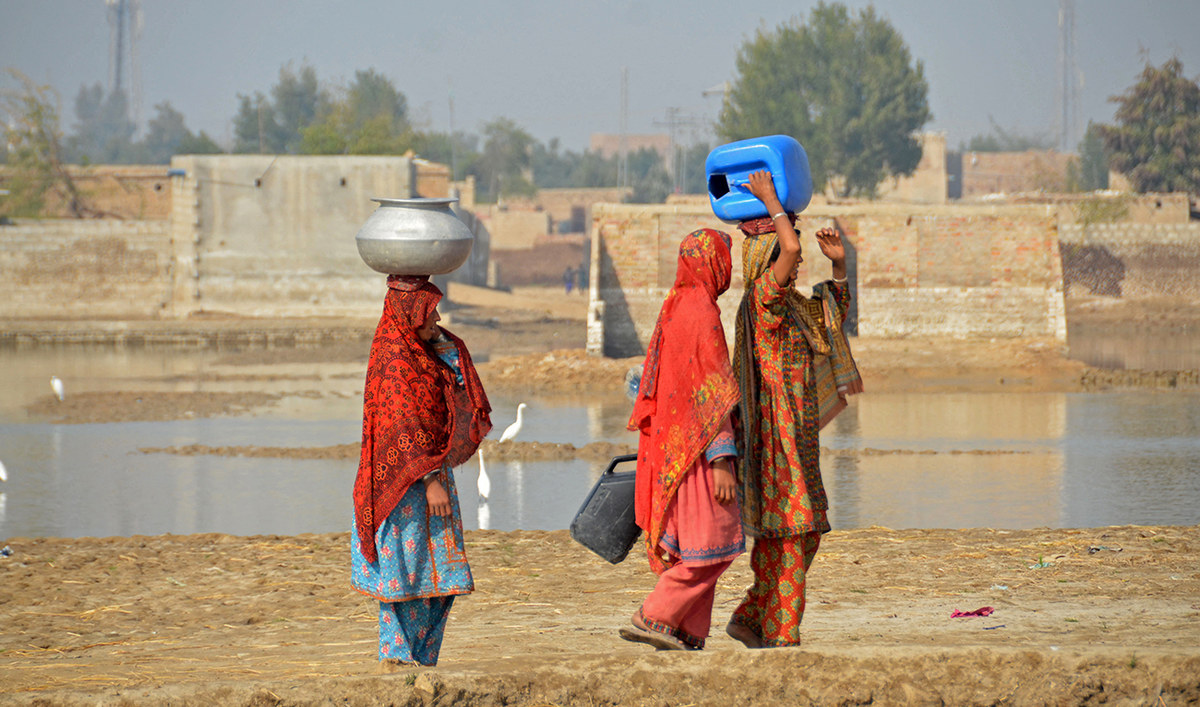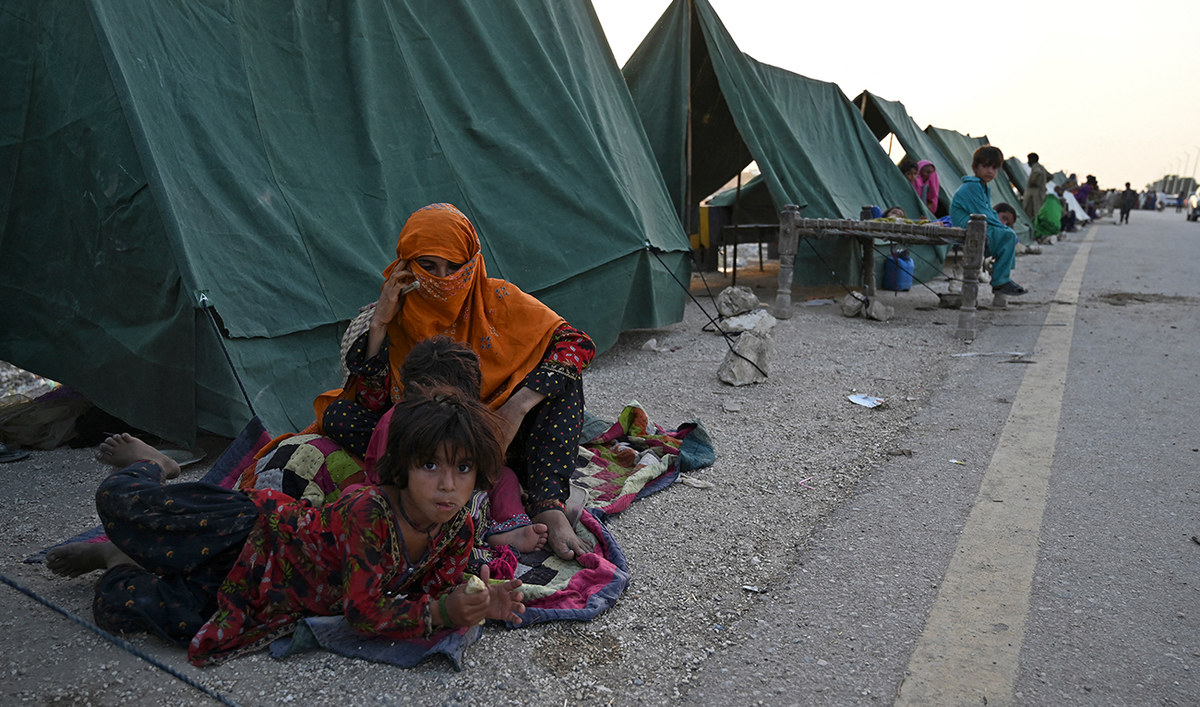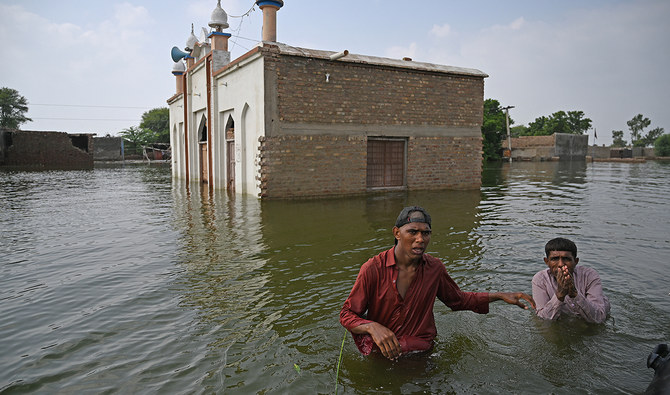SANGHAR, Sindh: When devastating floods swept through Dalel Khan Shar village in Pakistan’s southern Sanghar district, Saleha Sher, along with other villagers, was forced to relocate to makeshift tents situated a kilometer away for two months after their homes were destroyed. They returned once the waters receded, confronting significant damage.
In June 2022, unusually heavy monsoon rains and glacier melting triggered catastrophic floods across Pakistan. A comprehensive post-disaster needs assessment led by the Pakistani government, in collaboration with UN agencies and the World Bank, revealed that the floods had impacted more than 33 million people and inflicted losses exceeding $30 billion.
Sindh, Pakistan’s southeastern province, known for its vast deserts and extensive coastline, was identified as the hardest-hit region, accounting for nearly 70 percent of the total losses and damages. Critical sectors such as housing, agriculture, livestock, transport and communications suffered significantly.
As Pakistan approaches the general elections on Feb. 8, there’s a noticeable shift in voters in Sindh who are advocating for development initiatives aimed at mitigating future climate-related disasters.

Flood-affected residents walk to collect water in the flood-hit area of Dera Allah Yar in Jaffarabad district of Balochistan province on January 9, 2023. (AFP/File)
“Reconstructing homes washed away by the 2022 floods is the primary demand of our village residents from candidates in the upcoming elections,” Sayaan Bheel, a 60-year-old Hindu resident of Majnu Waadho village in Sanghar, told Arab News. “Living in damaged houses for a year-and-a-half after the floods is very hard for us.”
Saira Bano, who is contesting elections from NA-210 in Sanghar on the Grand Democratic Alliance’s (GDA) ticket, informed that voters in her Tando Adam city were calling for climate action this time. She noted that oil and gas drilling companies in her constituency were neglecting safety measures, which could ultimately lead to chronic diseases such as cancer, hepatitis and asthma.
Bano said voters were now demanding a proper drainage system to clear excess rainwater, accusing the Pakistan Peoples Party (PPP), the GDA’s rival faction, of ignoring their demands despite ruling the province for three consecutive terms.
“Before the 2022 floods, small nullahs linked to the province’s main drainage weren’t cleansed,” she told Arab News. “The establishment of small dams could have stored rainwater for agriculture and drinking.”

Internally displaced flood-affected people sit outside their tents at a makeshift camp after heavy monsoon rains in Sukkur, Sindh province on September 5, 2022. (AFP/File)
She mentioned that voters in NA-210 Sanghar lacked clean drinking water and sewerage systems, leading to the spread of diseases.
The last provincial administration of Sindh, led by the PPP, launched the Sindh Peoples Housing for Flood Affectees (SPHF) project with an ambitious plan to rebuild two million houses affected by floods.
Despite the reconstruction of thousands of residential units under the scheme, Dalel Khan Shar villagers have been urging candidates to prioritize the construction of a “sim nullah,” a drainage channel or stream to carry rainwater, near their village.
The absence of a proper rainwater drainage system, they say, causes frequent flooding, which has happened four times since 2010.
Naveed Dero, a former lawmaker and PPP’s candidate for the 2024 elections from Sanghar’s PS-40 constituency, also mentioned a significant shift in voters’ priorities. In contrast to 2018, when people demanded the construction of roads and schools while seeking more employment opportunities, they are now demanding the presence of proper drainage facilities.
“Post-2022 floods, even with low rainfall, the impact prompts a strong desire among the public for swift and enhanced drainage infrastructure,” Dero told Arab News, specifically mentioning the need for sim nullahs. Those who lost homes in the 2022 floods also seek rehabilitation.
Mushtaque Junejo, an independent candidate backed by former prime minister Imran Khan’s Pakistan Tehreek-e-Insaf (PTI) party for the same provincial seat, says Khan prioritized climate change in the party’s manifesto long before voters started demanding improved flood-related infrastructure.
“If PTI-backed candidates come into power, we will overhaul the drainage system in agricultural regions, including Sanghar, to address prolonged floods caused by inadequate drainage,” he told Arab News.
Meanwhile, Saleha Sher, who lost her house before it got another one under the SPHF project, said she had been granted the first-ever property ownership rights for the government land where her new residential unit is now situated.
“I’m thankful to the authorities for launching this rehabilitation scheme, and it will also reflect in my voting,” she told Arab News. “Owning my house brings me happiness and empowerment. Now, nobody can evict me.”
















